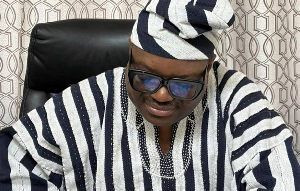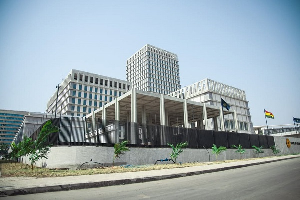The First Lady, Dr. Lordina Mahama has called on the Ghanaian Society to encourage community service with effective supervision for minor offences as an alternative to imprisonment to help reduce congestion in the prisons.
She said minor offences like stealing should be given community services as their sentences, instead of putting all such offenders to prisons which are already congested.
"This, I believe, would help decongest the prisons as well as reduce the burden on the budget of the Prisons Service”, Mrs Mahama said in an address during a visit to the Medium Security Prison in Nsawam in the Eastern Region on Wednesday.
The Nsawam Medium Security Prison is made up of two prison establishment, which are the Male and Female Prison, and these facilities are currently holding in custody, the largest number of prisoners in the country.
It currently has in custody, 2,915 convicts and 333 remand prisoners.
The visit, therefore, afforded the First Lady, who is also the President of the Organisation of African First Ladies Against HIV/AIDS (OAFLA), the chance to interact with the inmates and to present the infirmary at the Nsawam Prison, with some hospital equipment to aid the smooth running of the health facility.
By the visit, Mrs Mahama has been recorded as the first ever sitting First Lady to have visited a Prison, a move which was been highly appreciated by both authorities of the Prisons Council and the inmates as well.
Among the items presented were theatre bed, catheters, syringes, mosquito nets, collar, forceps, bandages, gauze, beds, mattresses, blood pressure devices, wheel chairs, blood sample machines, bandages and gloves.
The inmates were also given some bags of rice, cooking oil, tin tomatoes and sugar, for their nourishment.
Mrs Mahama who earlier on visited the Akropong School for Blind as a Parton of the School, to interact with inmates there, said her maiden visit to the Nsawam Prison followed that of President John Dramani Mahama’s visit last year where he launched the “Efiase Project”.
She said since the Lordina Foundation was involved in medical outreaches, and having presented medical equipment, supplies and logistics to many disadvantaged medical facilities all over the country, she deemed it fit to donate the items to the Nsawam Prison.
She added the donation was also based on what President Mahama told her about the Infirmary when he visited, saying, it was in need of urgent medical supplies and equipment.
“To this end, Lordina Foundation, is here to make this donation to your infirmary, to help improve the health conditions of the prison inmates, most especially, the female inmates”.
Mrs Mahama said even though it was not compulsory to test for HIV and AIDS, inmates should consent to testing for HIV and AIDS in order to know their status and to receive early treatment, saying early detection and treatment of the disease was a better option.
She emphasized the need for prisoners to enjoy their basic rights to healthcare, saying that their living conditions should promote rather than destroy their good health.
She also asked that female prisoners, especially, should be given access to healthcare treatment whilst adequate arrangements must be made for pregnant prisoners to give birth at a health facility outside the prison.
She said the over 15,000 people in Ghana’s prisons was a good human resource that could be utilized for economic growth and development of the country and so they needed to be equipped with the appropriate vocational skills, saying that would also help to reduce inmates’ risk of reoffending, by teaching them useful skills that prepare them for the world outside prison.
The First Lady expressed government’s commitments to improving and resourcing the Prison Services, with various logistics like vehicles, to ease longstanding transportation challenges and expansion of accommodation facilities.
General News of Friday, 11 March 2016
Source: Sandow S Kpebu
First Lady visits Nsawam Prison and School for the Blind
Entertainment

Chez Amis CEO addresses NACOC arrest allegations
Opinions










